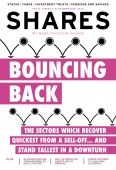Archived article
Please note that tax, investment, pension and ISA rules can change and the information and any views contained in this article may now be inaccurate.
Know your fund: The Scottish Investment Trust

The Scottish Investment Trust (SCIN) is an independently managed global trust seeking to provide shareholders with longer-term capital appreciation and above-inflation annual dividend growth.
Investing in undervalued, unfashionable companies that are ripe for improvement, at 824p ‘The Scottish’ trades on an 8% discount to net asset value (NAV) with scope to narrow in given a market rotation from growth to value.
One of the trust’s key attractions is an enviable 35-year record of annual dividend growth – The Scottish is an Association of Investment Companies’ (AIC) ‘Dividend Hero’.
THE STYLE
The Scottish is managed by patient contrarian Alasdair McKinnon, who seeks to ignore the ‘madness of crowds’ and invest in deeply out of favour areas of the global stock market where recovery potential is being overlooked.
Based on behavioural finance theory, the team’s process results in a ‘best ideas’ portfolio of global names with scope to re-rate thanks to operational and/or cyclical improvements. McKinnon also looks for downside protection in the form of cash-generative business models and strong balance sheets.
As the factsheet states, ‘our portfolio is unlike any benchmark or index and we fully expect to have differentiated performance’. And additionally, ‘our approach will not always be in fashion but we believe it delivers above-average returns over the longer term, by which we mean at least five years.’
GETTING ITS DUCKLINGS IN A ROW
McKinnon believes markets are driven by cycles of emotion rather than dispassionate calculation, which creates profitable investment opportunities.
He aims to exploit the natural tendency of investors to ‘follow the herd’ and chase stocks that have already done well, while other areas of the market remain largely ignored.
‘As contrarian investors, we think a better balance between risk and reward can be found by focusing on unloved and unfashionable stocks,’ McKinnon informs Shares.
‘We don’t set out to be boring but we find that by the time everyone agrees that the prospects for a company look rosy, it’s instead time to start worrying about what can go wrong.’
He continues: ‘In some ways, we think about things in terms of expectations management. To use a real life example, most of us have fairly low expectations if we stay at a budget hotel but fairly high expectations if we stay at a more upmarket place.
‘It’s only human. Even though the actual experience is almost certain to be better at the superior establishment, it won’t necessarily create greater overall satisfaction as it has to meet (and exceed) a lofty standard.
‘It’s the same with stocks. When expectations are high, the scope for disappointment increases. We’ve seen this multiple times in recent years – hot themes rise then fall with the later entrants burned.’
McKinnon places his companies into three categories; ‘ugly ducklings’ are very out-of-favour firms where poor sentiment is coupled with operational challenges, yet which boast recovery potential. Examples include supermarket Tesco (TSCO).
‘We still hold Tesco as one of our “ugly ducklings” but that may be reviewed in light of encouraging progress with its turnaround plan,’ explains McKinnon. ‘(CEO) Dave Lewis leaves the business with a pat on the back, having taken the business from laggard to leader.’
The ‘change is afoot’ category spans stocks where operational improvements are beginning to take hold, but which remain overlooked by the majority of investors, whereas the ‘more to come’ bucket is a small part of the fund including stocks that have moved up through the other categories, are more favoured by the market, yet where underappreciated growth potential still exists.
WHAT ELSE IS IN THE PORTFOLIO
Other holdings include US clothing retailer Gap, GlaxoSmithKline (GSK) Japanese brewer Kirin, energy giants Exxon Mobil and Chevron, Marks & Spencer (MKS) and Dutch lender ING. McKinnon has also invested in select telecoms and gold miners.
He regards the outlook for the yellow metal as positive given lax monetary and fiscal policy, a deteriorating economic backdrop and an era of populist politics which leaves gold looking increasingly attractive as a store of value.
A recent strong performer has been BT (BT.A), which has ‘a turnaround strategy in place, with a focus on cutting costs and investing in network leadership. Philip Jansen, the new CEO, has added fresh impetus to this plan. We see BT as an interesting contrarian opportunity given the scope for operating recovery and an improving environment – we believe this potential is not yet reflected in the share price.’
PORING OVER PERFORMANCE
On a ten year view, The Scottish Investment Trust currently sits towards the bottom end of the AIC Global sector in share price total return terms, although medium and long term total returns have been respectable and year-to-date absolute returns strong.
Results for the six months to 30 April 2019 revealed a disappointing NAV total return of -0.1% in a less fruitful time for contrarians, with growth having outperformed value for such a prolonged period.
SHARES SAYS:
The Scottish Investment Trust’s active contrarian strategy and inflation-beating dividends have strong appeal, although patience may be required before McKinnon’s value calls come good. Buy and hold for the long term.
Important information:
These articles are provided by Shares magazine which is published by AJ Bell Media, a part of AJ Bell. Shares is not written by AJ Bell.
Shares is provided for your general information and use and is not a personal recommendation to invest. It is not intended to be relied upon by you in making or not making any investment decisions. The investments referred to in these articles will not be suitable for all investors. If in doubt please seek appropriate independent financial advice.
Investors acting on the information in these articles do so at their own risk and AJ Bell Media and its staff do not accept liability for losses suffered by investors as a result of their investment decisions.

 magazine
magazine









